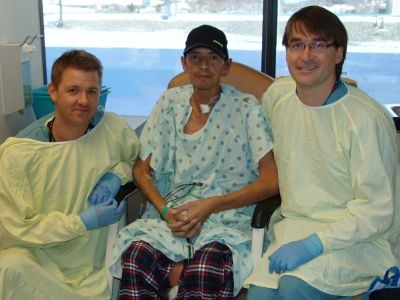When Terrance Sutherland was discharged from Health Sciences North Jan. 17, nobody was more surprised than his care team.
The 33-year-old Constance Lake First Nation man had been in hospital in Hearst with pneumonia-like-symptoms for about two weeks before being admitted to Health Sciences North's intensive care unit Nov. 11.
His doctors diagnosed him with blastomycosis, a lung infection caused by a fungus found in soil or wood. In severe cases, it is usually fatal.
Not long afterwards, Sutherland's condition worsened to the point that even a ventilator wasn't able to keep his oxygen levels high enough.
Respiratory therapists used a manual oxygen bag for hour-long stretches to boost his oxygen level enough to keep him alive.
That's when Dr. Matthew Cavanagh, the intensive care doctor responsible for Sutherland's care, suggested a procedure called extracorporeal membrane oxygenation (ECMO).
It was either that or let him die.
ECMO is a process in which blood is removed from the body through a tube, oxygenated by a machine, then returned to the body through a second tube placed near the heart.
It is only performed in a few centres in Ontario, and has only been attempted at Health Sciences North three times in the last 10 years.
The procedure is normally used in pediatric heart operations or on patients who need a lung transplant.
But Cavanagh said he'd also heard about ECMO being used during a recent influenza outbreak in Australia. Many of these patients had “disastrously low oxygen levels” similar to what Sutherland was experiencing.
“At that point they found they had good results,” he said. “That led to more of a interest worldwide in using this device for people with lung failure.”
Because Sutherland was on ECMO for 19 days, it took a team effort to care for him.
Five of the hospital's perfusionists, or health-care professionals who specialize in the running of circulatory machines, were responsible for keeping the ECMO machine operating 24 hours a day.
But because some of their duties include participating in major surgeries, they also trained some of the hospital's respiratory therapists to operate the ECMO machine.
“We did it, but (the perfusionists) were always on call with us,” said respiratory therapist Jacqueline Nolet.

This has got me thinking how precious life is.
Terrance Sutherland,
survived rare lung infection
“They never left the hospital. They were able to go down into the OR ... We were alone with the machine, but we were never alone in the hospital with the machine.”
Even after Sutherland's care team started performing ECMO, it took a while for him to bounce back, said Dr. Derek Manchuk, the medical director of the hospital's intensive care unit.
“So his life was very much threatened for a prolonged period, to be honest,” he said. “He was certainly the most ill patient in Northern Ontario, and probably one of the most ill patients in the country at certain times in the care.”
There are no reported cases of survival among patients with severe blastomycosis who have undergone an ECMO procedure.
“I think he may be a world first,” Manchuk said. “I was pleasantly surprised at how he's done.”
Antibiotics were used to rid Sutherland's body of the fungus.
The hospital workers said the fact Sutherland — a father of two who works as a miner and firefighter — survived is a testament to the man's strength of spirit, as well as the care he received.
When Sutherland was finally taken off the ventilator, Manchuk had a number of conversations with him.
“He's a wonderful young man who's very happy to be alive and going back to see his family and friends.”
While neither the patient or his family members were available for comment, Sutherland provided a written statement about his experiences for members of the media.
“This has got me thinking how precious life is,” Sutherland said.
“Thank you to the staff at ICU for taking such good care of me. They have been so nice to me. Thank you to HSN for all you've done. I'm looking forward to being back home with my family and friends. I'd like to thank everyone for their prayers. God bless.”
